THE SUMMIT

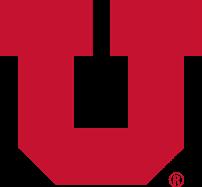





The Department of Physical Therapy and Athletic Training recently clarified our core values to be Excellence, Respect, Innovation, Inclusivity & Belonging, Compassion, Collaboration, Social Responsibility, and Wellness.
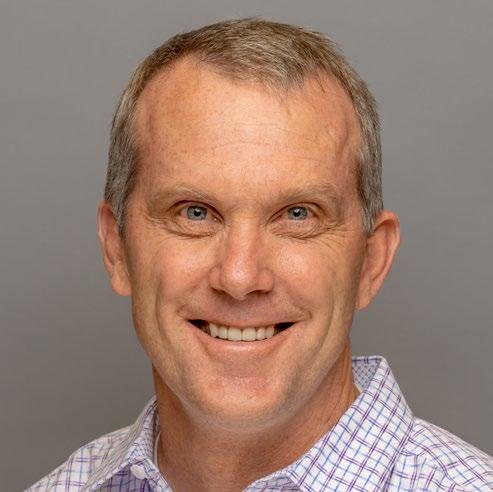
 LEE DIBBLE, PT, PhD, ATC, FAPTA Professor, Department Chair
LEE DIBBLE, PT, PhD, ATC, FAPTA Professor, Department Chair
Looking back on 2023, collectively, the students, staff, and faculty focused our efforts on honoring these values through work with significance and impact. In the pages that follow, you will find summaries of community impact through outreach and service, patient care impact through our post-graduate residencies, scientific impact through innovative research, and educational impact through our high caliber educational programs.
The Summit can only highlight a portion of the impactful work done throughout the Department, so here is a snapshot of other meaningful contributions:
• Reducing rehabilitation health disparities and improving health equity. Through care provided in four Pro Bono clinics and research examining telehealth delivery of care to rural health clinics, we seek to improve access to rehabilitation care.
• Raising the bar of neurodegenerative disease medical and rehabilitation care. Department faculty help individuals with ALS, Parkinson disease, and other disorders navigate the changing rehabilitation needs that come with disease progression. Based on the quality of the health care team and infrastructure, the University was recently named a Parkinson’s Foundation Center of Excellence.
• Contributing to the quality of health care education. Our service spans the Department, the College, the University, the State, and our professions. Examples of this service, include but are not limited to Interprofessional Education within University Health, the Utah Department of Occupational and Professional Licensing, professional accrediting bodies, non-governmental organizations providing international medical service, professional associations, and federal agencies.
• Mentoring the next generation of faculty in health sciences programs. Rehabilitation Sciences PhD program faculty guide PhD students to push the boundries of scientific knowledge and become expert teachers. Alumni from our PhD program have gone on to post-doctoral fellowships, independent research careers, and faculty positions at institutions throughout the US and around the world.
Each day, I am reminded how fortunate I am to work with our students, faculty, and staff. Their work makes the Department and it’s programs / pathways successful. The outcomes in terms of student learning, scientific contributions, and community service, are a testament to the valuable work that they do – I hope this synthesis of Department activities helps you appreciate their impact.
Dr. McKenzie graduated Magna Cum Laude from the University of Utah in 1981 with a BS in Physical Therapy. She went on to complete a MA, a PhD, and a post-doctoral fellowship in Anatomy from UC Berkeley before joining the faculty of at the University of California, San Francisco. In 1995, she joined the faculty of Chapman University , receiving her DPT from there in 2012. Dr. McKenzie is currently a professor in the Department of Physical Therapy at Chapman University where she is the Director of Anatomy Laboratory operations. Dr. McKenzie balances that role with her role as a Project Scientist in the The Department of Neurology at the University of California, Irvine. She has played an integral role in the evolution of the Department of Physical Therapy and Chapman University, holding multiple leadership positions during her tenure there – including but not limited to leading the development of the anatomy curriculum, recruiting and mentoring faculty, designing new laboratory facilities, establishing an international clinical rotation in Costa Rica, and serving as the president of Chapman’s Faculty Senate and AAUP chapter.
Dr. McKenzie’s primary research interest is the area of neuroplasticity, specifically focusing on the recovery of upper extremity function post-stroke as well as focal hand dystonia. Integrating her education and training in Neuroscience and Anatomy with her clinical expertise in physical therapy, Dr. McKenzie investigates innovative therapeutic approaches with the aim of fostering neural repair and restoration of function. Dr. McKenzie and her collaborators have examined intensive interventions and technology-based treatment approaches that incorporate game based telerehabilitation, Augmented Reality, Virtual Reality, robot-based therapies, and Brain-Computer Interface technologies. In addition, she conducts outcomes-based research to evaluate the effectiveness of the inter-disciplinary Stroke Boot Camp community outreach program that she developed and related, emerging models of care.
Dr. McKenzie is an expert teacher who emphasizes critical thinking, clinical reasoning, and application to clinical practice to facilitate student learning. Over the years, she has taught and mentored
Dr. McKenzie’s primary research interest is the area of neuroplasticity, specifically focusing on the recovery of upper extremity function post-stroke as well as focal hand dystonia.
thousands of students, clinicians, and faculty members. As the Vice-Chair of the APTA’s Anatomy Educators Special Interest Group, which she helped establish, she strives to improve DPT education through Evidence-Based teaching. In recognition of her extensive valuable contributions to the profession, Dr. McKenzie has by the APTA as a Catherine Worthingham Fellow and and numerous awards including the APTA Societal Impact Award, The California Physical Therapy Association’s Noland Award of Merit, and Chapman University’s Valerie Scudder Award for outstanding faculty teaching, research, and service.
 DR. ALISON MCKENZIE, PT, MA, DPT, PhD, FAPTA
DR. ALISON MCKENZIE, PT, MA, DPT, PhD, FAPTA
Dr. McKenzie is an expert teacher who emphasizes critical thinking, clinical reasoning, and application to clinical practice to facilitate student learning.

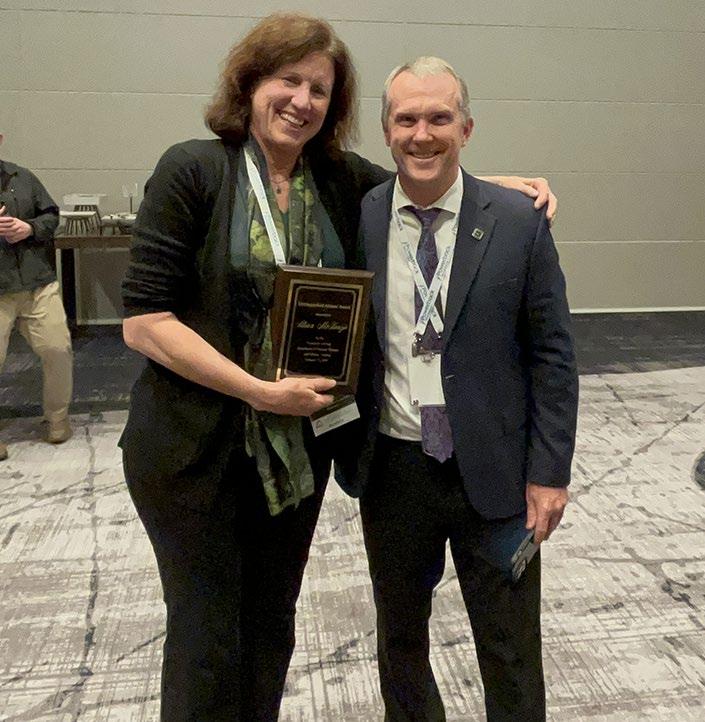
Dr. Natalie Surut is currently a physical therapist specializing in women’s health / pelvic floor PT and is a part of the Therapeutic Exercise Teaching team within the Department. For Dr. Surut, this clinical role continues her history of leadership as well as her broad and sustained advocacy for women. As an undergraduate at Westminster College, Dr. Surut participated in sexual assault victim advocacy work at the Rape Recovery Center and her organization of Westminster College’s “Take Back the Night” event demonstrating her commitment to service at the individual and community levels. While in the DPT program, Dr. Surut was the driving force in the creation of our “Women in Leadership Group” to increase awareness of the underrepresentation of women in leadership positions in PT, advocate for her peers, and provide a platform to bring together female and male community therapists, faculty and students to talk about and action plan for meaningful change. This group has now expanded to be a special interest group within
the Utah Chapter of the APTA. Dr. Surut’s efforts were magnified by her leadership in building collaborations with student leaders from our Diversity, Equity, and Inclusion Alliance, and advocacy groups for LGBTQI+ rights and education.
Following graduation, Dr. Surut was selected as a APTA Leadership Scholar where she participated in a 12-month program designed to deepen participants’ understanding of the APTA and its various branches that aim to progress the profession of physical therapy. Dr. Surut stated that the highlight of the program was “… the annual Leadership Congress where we had the opportunity to share our own leadership journeys, engage with and learn from APTA leadership, and participate in advocacy events on Capitol Hill. This was an invaluable experience that has invigorated me to continue to engage with the APTA at the state and national level.”
We look forward to the meaningful impact that Dr. Surut will have as she continues her leadership journey.
While in the DPT program, Dr. Surut was the driving force in the creation of our “Women in Leadership Group” to increase awareness of the underrepresentation of women in leadership positions in PT.

Dr. Surut was selected as a APTA Leadership Scholar where she participated in a 12-month program designed to deepen participants’ understanding of the APTA and its various branches that aim to progress the profession of physical therapy.

As the Doctor of Physical Therapy program has grown, the Department has also expanded its focus on student support and programs that enhance the student experience. One initiative introduced this academic year is the Supplemental Instruction program. Supplemental Instruction (SI) is commonly used in universities across the country to assist students in traditionally challenging courses and to promote group-based study. SI is led by second- and third-year DPT students and study sessions are driven by students’ needs. SI Leads facilitate question and answer on topics covered in class the previous week, review challenging material, and discuss study strategies. Attendance at Supplemental Instruction is voluntary, and all students are encouraged to attend.
Sahand Seifollahi, a third-year student, has been an SI Lead for Gross Anatomy, Pathokinesiology, and Cardiopulmonary Management. Sahand said, “My experience as an SI lead has facilitated a greater appreciation for the amount of work our professors put in. I have developed a deeper understanding of academic material and gained experience with teaching and implementing course-specific knowledge. It’s been a tremendously gratifying experience to contribute to the learning of the future generation of therapists and to make friends along the way.”
Summer 2023 was the inaugural semester for Supplemental Instruction with a focus on Gross Anatomy. Sessions were held once a week for an hour and a half. The St. George and Salt Lake City pathways received SI in-person while Hybrid had a session via Zoom. Students were also able to join an all-pathway session via Zoom for additional study support. Supplemental Instruction continued with sessions for all fall semester first-year courses as well as sessions for Neuroanatomy and Cardiopulmonary Management this past spring.
Diana Robinson, a first-year student in the Hybrid pathway, regularly attends SI. In her experience, “It’s created a community and connection to school. As a Hybrid student we have live sessions after lectures and faculty office hours. SI is that extra time we can talk to someone that was in our shoes 1-2 years ago and make connections and learn. If I need extra clarity on a part of the course or if I just have no idea where to start, SI can show me where to start and give me advice on how to do well in that course.”
As the SI program evolves, the emphasis will be on educating students on how to better utilize and be prepared for Supplemental Instruction. In addition, the program will prioritize better training of SI Leads, providing Leads with instructional resources, and assessment.

“It’s created a community and connection to school. As a Hybrid student we have live sessions after lectures and faculty office hours. SI is that extra time we can talk to someone that was in our shoes 1-2 years ago and make connections and learn. If I need extra clarity on a part of the course or if I just have no idea where to start, SI can show me where to start and give me advice on how to do well in that course.”
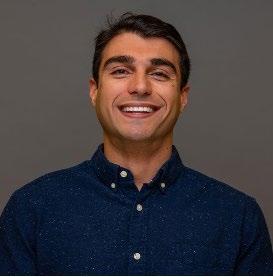
“My experience as an SI lead has facilitated a greater appreciation for the amount of work our professors put in. I have developed a deeper understanding of academic material and gained experience with teaching and implementing course-specific knowledge. It’s been a tremendously gratifying experience to contribute to the learning of the future generation of therapists and to make friends along the way.”
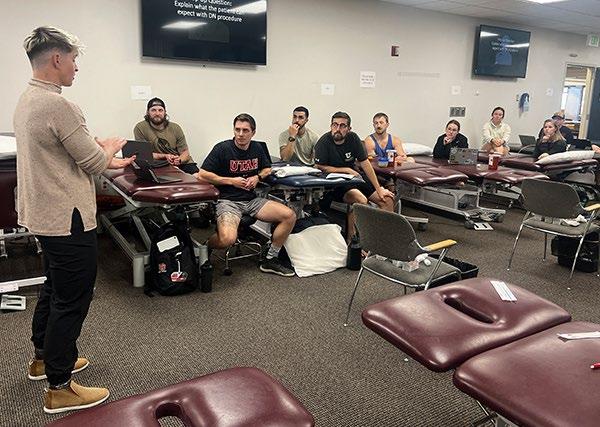

Established in 1965, the University of Utah College of Health boasts a storied history characterized by noteworthy achievements and a steadfast commitment to advancing health education, research, and community engagement. It has played a pivotal role in shaping health care professionals, fostering interdisciplinary collaboration, and contributing to the overall well-being of individuals and communities.
With a legacy spanning over 55 years, the college has consistently offered a diverse range of health-related programs, adapting to the dynamic nature of health care and the escalating demand for skilled professionals in various health-related fields.
In a strategic response to the evolving health care landscape and the recognized importance of a multidisciplinary approach to address complex health issues, the College of Health established the Division of Health Sciences in 1968. This move brought together a spectrum of programs, including nursing, public health, and allied health sciences, under a unified umbrella, promoting collaboration and synergy among disciplines.
As the demand for health care professionals escalated, the College of Health responded proactively by introducing new programs and expanding its facilities. Presently, the college offers a comprehensive suite of over 40-degree programs, comprising 18 Baccalaureates, 16 master’s, three clinical doctorates, and five Ph.D. programs across multiple disciplines. This extensive academic portfolio reflects the college’s commitment to meeting the evolving needs of the health care industry and providing students with
a robust education that aligns with both modern and future health care demands.
Continuing the College of Health’s evolution of addressing the future needs across the health care profession, The College of Health participates in the Saturday Academy. The goal of this program is to expose elementary to high school student to health sciences programs that they may pursue as they continue their education. This platform enables departments to showcase their field through scholarly activities while offering professional development to graduate and undergraduate students serving as mentors in higher education, with a focus particularly on health sciences.
The Department of Physical Therapy and Athletic Training and the Department of Occupational and Recreational Therapies were the recent focus of Saturday Academy held on October 21, 2023, with over 40 staff, faculty, and student volunteers participating. Student Volunteers, under the watchful eyes of faculty experts, conducted lectures and hands-on activities designed to educate and encourage the nearly 100 fourth through twelfth-grade students in attendance to gain the skills and knowledge required to graduate from prominent programs within the College of Health. With an extensive array of disciplines able to be showcased, the college was also featured in the Saturday Academy event on March 16, 2024, further demonstrating its commitment to “Leading the transformation in health care from primarily caring for the sick empowering people to be healthy, active and resilient through proactive, preventative, and rehabilitative care” (The College of Health, n.d.).
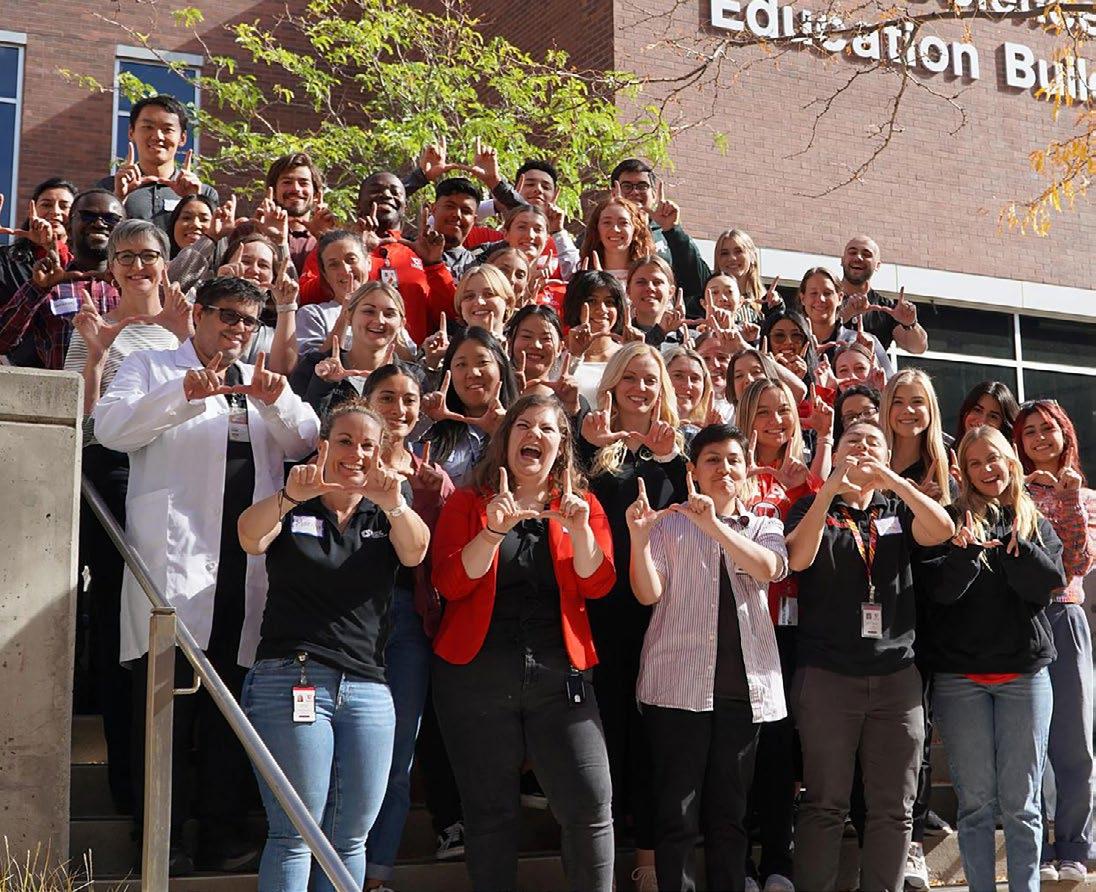
Through innovative research and by preparing the next generation of practitioners, the College of Health is on a mission to add more years to our life and life to those years.

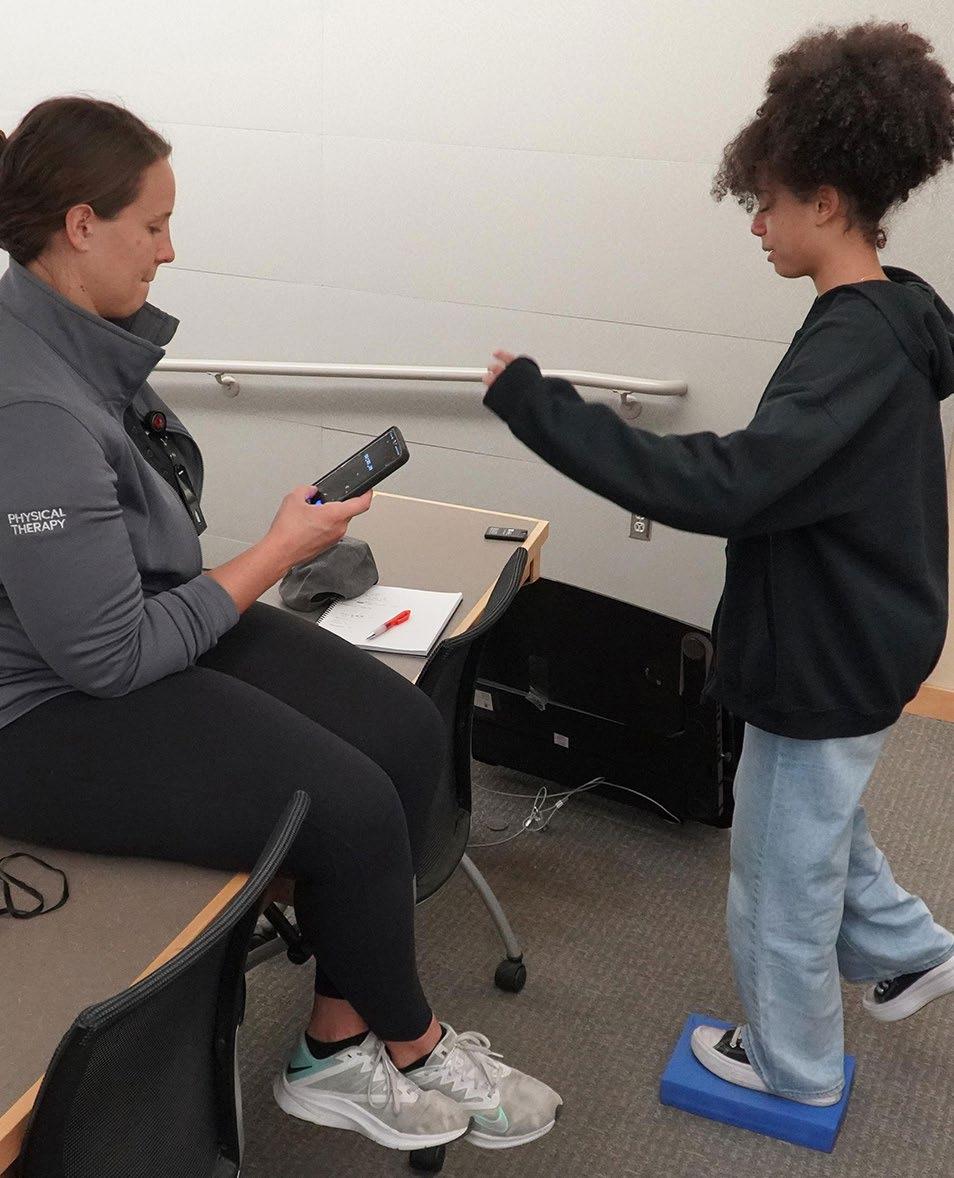

I first want to wish everyone an excellent 2024. As we moved into the new year, I took time to reflect on the past five years since I started as Athletic Training Program Director at the University of Utah. We made multiple goals when I began, and due to the outstanding faculty, staff, students, and alums, we achieved almost everything we set out to accomplish. We created one of the premier Master of Athletic Training degrees in the western United States. We often receive fantastic feedback about you, our alumni, and students, about your effort and knowledge that uplift your clinical settings. We thank you for helping make this program unforgettable! You have enabled us to achieve our goals of increasing our Board of Certification pass rate and job placements. With your help, we are performing impactful healthcare in the community by participating in events like the Junior League CARE Fair, Saturday Academies, interprofessional clinics, and other events. We have started global engagement with our membership in the World Federation of Athletic Training and Therapy and a new study abroad opportunity. We have increased our research network and impact best practices in athletic training. We have achieved our program goals due to the wonderful people in our program. I thank the faculty and staff, who are
excellent examples of selfless mentoring and dedication to the students. I thank you, our students, and our alumni most of all. You are terrific examples of care and hope for your future careers. Your attitudes make our athletic training program and community a better place. Thank you, and I look forward to the coming years of our athletic training program because of everyone involved.
 JUSTIN RIGBY, PhD, ATC, LAT Program Director, Masters of Athletic Training
JUSTIN RIGBY, PhD, ATC, LAT Program Director, Masters of Athletic Training

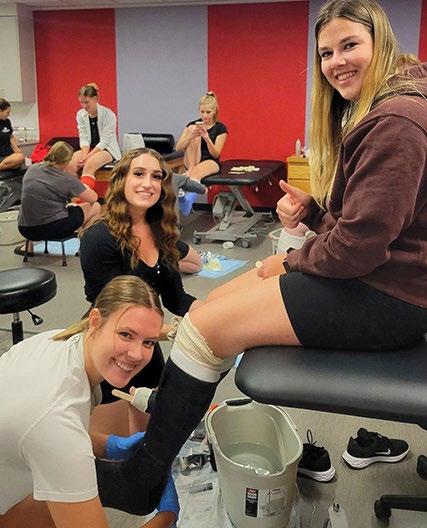

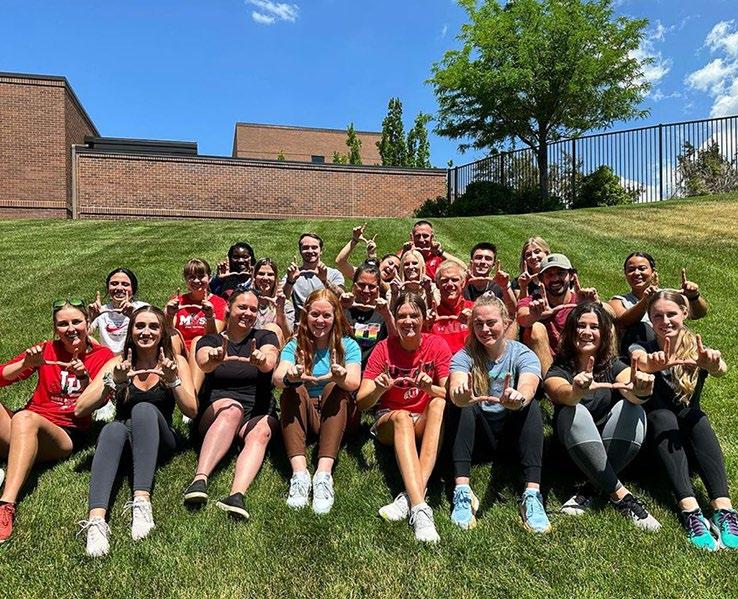
Greetings! I hope this update finds you in good health and high spirits. When asked to provide this update, I couldn’t help but think of the past and the advances we have made since I was a student in this program. I enrolled in the University of Utah in 1992 and graduated with my bachelor’s degree in physical therapy in 1994. My class was composed of 29 students and our single classroom and single laboratory were held in rickety old military barracks that no longer exist. Since that time, the program has been innovative and proactive about addressing the needs of our communities and advancing the profession. As a result, our program has transitioned from a bachelor’s to a master’s to a clinical doctoral degree program while increasing research contributions and post-graduate training opportunities through a PhD program and physical therapy residencies. Our recognition of health disparities and the influence of social determinants of health on rehabilitation health outcomes motivated us to consider how we might better contribute to increased access to physical therapy and how our Salt Lake City residential DPT program could expand educational opportunities to groups of students under-represented in the profession. Participation in pro bono clinics and the creation of our St. George and hybrid DPT pathways represent efforts towards those objectives.
The Salt Lake City based residential DPT program has served as the foundation for our educational, service and research innovations. Building on this foundation has allowed meaningful growth. For example, expansion of how our DPT content is delivered gave us the unique opportunity to examine and update our curriculum, expand our use of contemporary pedagogy, hire faculty with additional areas of expertise, implement student success
programs, expand our students’ clinical experiences, and improve our facilities. All of these innovations have allowed us to expand our reach, while staying committed to our mission of providing a high-quality Doctor of Physical Therapy education to aspiring physical therapists in Utah and across the country. The partnership between our high-quality students and our dedicated staff and faculty continues to produce enviable student outcomes. Last year, our 48 Salt Lake City based third year students excelled in their clinical experiences and went on to achieve a 100% ultimate pass rate on the National Physical Therapy Board Examination and a 100% employment rate. Beyond excelling in their didactic coursework and clinical internships, these students graduated with a passion and vision to expand physical therapy services to populations who have historically lacked access to care. I am very proud of all of our students and look forward to attending future graduation ceremonies that will soon include students from all the pathways. Thank you for your continued support and involvement in shaping the next generation of physical therapists.

 BO FOREMAN, PT, PhD
Overall DPT Program Director, SLC DPT Pathway Director
BO FOREMAN, PT, PhD
Overall DPT Program Director, SLC DPT Pathway Director
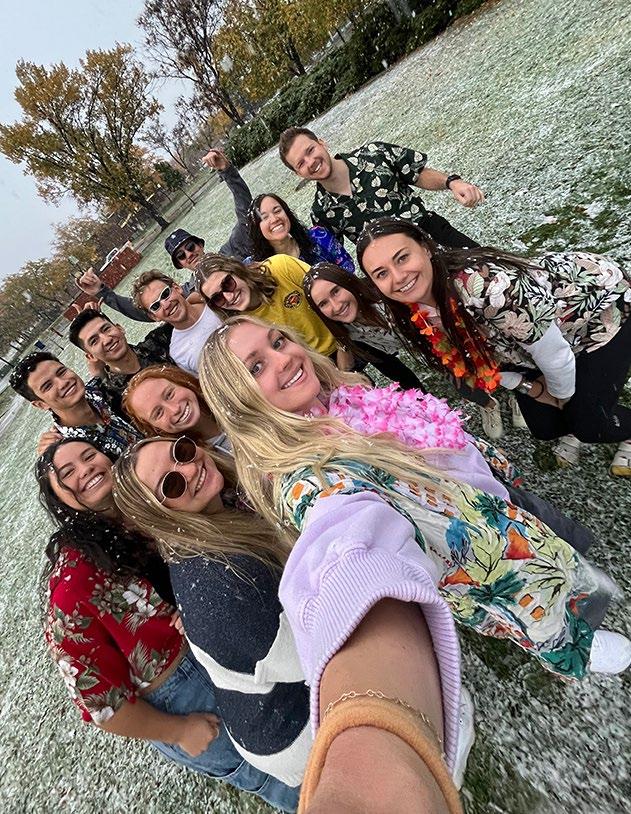
The Salt Lake City based residential DPT program has served as the foundation for our educational, service and research innovations.



The University of Utah DPT Expansion in St. George continues with the second year of implementation. Everything is a “first” for us down in St. George as we exhibit the excellence of our DPT curriculum and the flexibility of students and faculty each day. The initial cohort successfully completed their first Integrated Clinical Experience (ICE) from Year 1 and their full-time summer experience as well with strong, positive feedback from the supervising clinicians. The second cohort has started their ICE this Spring in facilities in and around St. George. All faculty and staff have been hired and local clinicians continue to assist with hands-on laboratory sessions. Full-time and clinical faculty represent specialists in orthopaedics, pediatrics, acute care, sports medicine, and administration. St. George faculty and visiting Salt Lake City faculty are always available to support our students.
DPT students in St. George have been able to participate in community outreach with distinctive activities. These include the Go-Baby-Go project for 2 years now, the Health Careers Expo with immersion activities to acquaint local area high school students with the profession of physical therapy, and teaching projects with Shivwits Band of Paiutes community clinic. Ongoing efforts include establishing the PT Pro Bono Clinic with targeted implementation by Summer 2024, expanding community awareness of the profession
of PT with student outreach to the FourCorners region, and continued community engagement projects.
We are so proud of the students that we have in St. George. We get to know them so well. We go to each other’s celebrations. They always readily contribute, they support each other, and are such a critical part of our St. George family.
The St. George Pathway continues as a deliberate expansion of our department mission to increase diversity within the profession as well as expand healthcare to communities across southern Utah and the underserved areas of the US.
 CATHERINE ORTEGA, PT, EdD, ATC, OCS Pathway Director, St. George Pathway
CATHERINE ORTEGA, PT, EdD, ATC, OCS Pathway Director, St. George Pathway


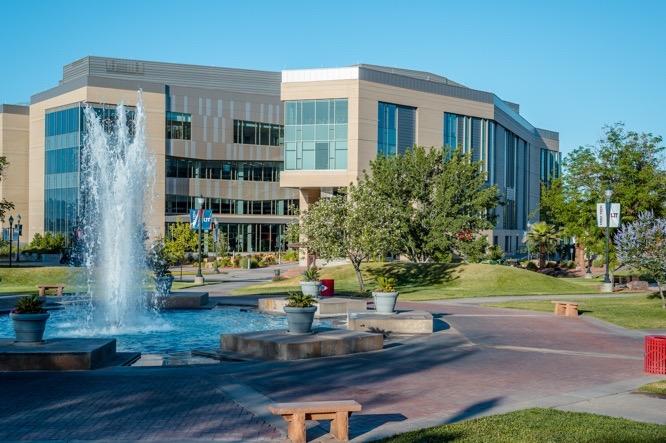

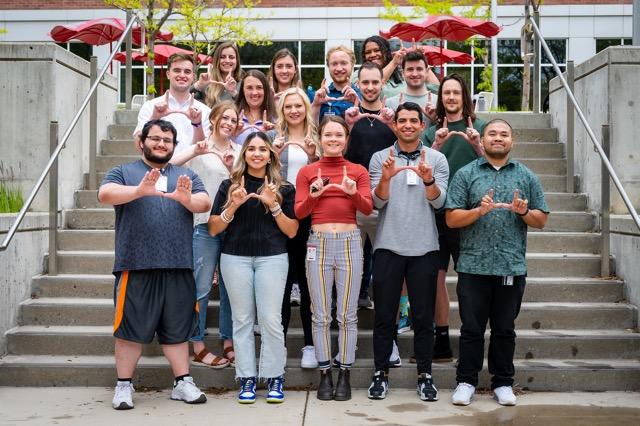

We are so proud of the students that we have in St. George. We get to know them so well. We go to each other’s celebrations. They always readily contribute, they support each other, and are such a critical part of our St. George family.
Last year proved to be an exciting year for the UofU DPT program as we expanded our commitment to excellence and serving the health of society. We are excited to announce the expansion of our program through the introduction of the new DPT Hybrid Pathway. This innovative educational pathway blends online and in-person learning and aims to broaden access to DPT education. This enables aspiring physical therapists across the country to earn their DPT from a toptier institution without the need to relocate to Utah. Last summer, we proudly welcomed the Class of 2026, which included our residential cohorts in Salt Lake City and St. George and an inaugural hybrid cohort of 50 students from 15 different states, spanning 5 time-zones.
As we look forward to 2024, the UofU DPT program celebrates 55 years of excellence – an enduring program with visionary leadership and exceptional faculty, dedicated to student success, innovation, and transforming physical therapist practice. This foundation, in collaboration with a strategic university partnership with Univervsity Connected Learning (UCL), along with the expansion of our highly qualified faculty team, has allowed us to translate our curriculum to a dynamic and engaging hybrid model. Regardless of the pathway students choose, we are committed to providing an equitable education and a student experience that is accessible and fits one’s learning preferences.
I owe a debt of gratitude to the department leadership and faculty for their dedication to our shared vision and the substantial investment they’ve made, ensuring that our growth doesn’t compromise excellence. Over the last two years, our faculty has expanded to include experts with extensive experience in hybrid education from diverse institutions.
They include Drs. Jennifer Bogardus, Chad Decker, Mary Derrick-Manis, Katherine Franklin, Burke Jorgensen, Uchenna Ossai, and Laura Wenger. Additionally, Dr. Grayson Doar has transitioned to a full-time role in the hybrid pathway and serves as our Director of Immersion Education and Pathway Equity. Most recently, we finalized a national search and appointed an Associate Director of the Hybrid Pathway, Dr. Alicia O’Hara. In addition to the growth of our faculty, our staff support of the DPT program has also grown. Not only do we have a team of staff to support the hybrid pathway, but we also have a new Student Affairs and Admissions team that serves all 3 pathways. Additionally, we have invested in Marketing and Recruitment personnel to support the Department as a whole. These individuals have joined an experienced and established team of faculty and staff, that have collectively played a pivotal role in shaping this new pathway. Their insights and dedication have been instrumental in ensuring that the hybrid model not only upholds our program’s high standards but also enhances the learning experience for all students. In addition to expanding our human resources, we have invested in new infrastructure. The program opened a new lab space at 419 Wakara Way, across the street from our main building at 520 Wakara Way. This 5,000 sq ft lab has state of the art technology and is the site of in-person lab immersions for students in the hybrid pathway and a lab space for our residential students in Salt Lake City. While innovation and change are hard, we remain focused on our mission of excellence. The Hybrid Pathway is an innovative model of education designed to increase access and contribute to the diversity and of the physical therapy profession. By
cultivating a cohort of graduates from varied backgrounds, regions, and experiences, we aim to address healthcare disparities and elevate the quality of care in the communities we serve.
Thank you for your ongoing commitment to the University of Utah’s Doctor of Physical Therapy Program. Together, we are shaping the health of society.
Warm regards,

 JENNIFER L. HALE, PT, DPT, PHD Associate Professor and Director, DPT Hybrid Pathway
JENNIFER L. HALE, PT, DPT, PHD Associate Professor and Director, DPT Hybrid Pathway
 ALICIA ESPOSITO O’HARA,PT, DPT Assistant Professor and Assistant Director, DPT
ALICIA ESPOSITO O’HARA,PT, DPT Assistant Professor and Assistant Director, DPT
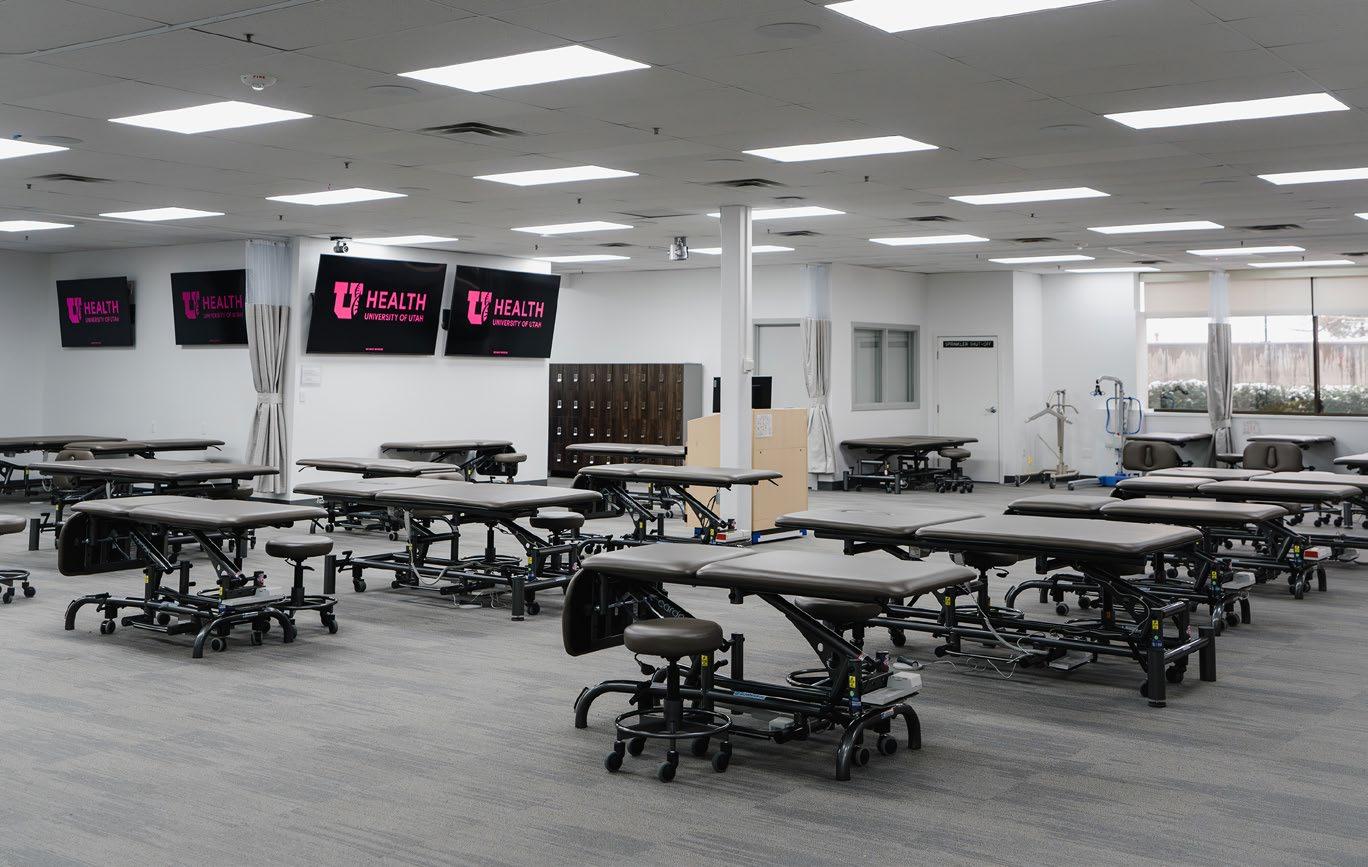

The Department of Physical Therapy and Athletic Training s is the home of 6 ABPTRFE accredited post-professional clinical These 12-14 month long residency programs prepare PTs for advanced clinical practice and leadership in their specialty area. of patient management in their specialty area and receive one-on-one mentoring with expert clinicians. They have focused a variety of professional development activities. Graduates may sit for a specialty-specific examination that qualifies
2011
NEUROLOGIC RESIDENCY
2011 First Matriculation
2012 Accreditation
Two Residents Per Cohort
22 Graduates
18 Faculty Members
12.5 Month Program
Key Partner Organizations:
• University of Utah Health
• Nielsen Rehabilitation Center
• Sugarhouse Health Center
@UtahNeuroPTResidency
2012
2014
ORTHOPAEDIC RESIDENCY
2012 First Matriculation
2014 Accreditation
Four Residents Per Cohort
43 Graduates
13 Faculty Members
12 Month Program
Key Partner Organizations:
• University of Utah Health
• University Orthopaedic Center
• Salt Lake City VA Medical Center
@UtahOrthoPTResidency
2019
2020
SPORTS RESIDENCY
2019 First Matriculation
2020 Accreditation
Two Residents Per Cohort
Four Graduates
16 Faculty Members
14 Month Program
Key Partner Organizations:
• University of Utah Health
• University Orthopaedic Center
• South Jordan Health Center
• University of Utah Athletics
• US Ski and Snowboard
• Brighton High School
• Herriman High School
@UtahSportsPTResidency
clinical education programs for physical therapists. area. Residents are exposed to the full spectrum focused didactic education and participate in qualifies them as board-certified clinical specialists.
2021
2022
ACUTE CARE RESIDENCY
2021 First Matriculation
2022 Accreditation
One Resident Per Cohort
Two Graduates
13 Faculty Members
12 Month Program
Key Partner Organizations:
• University of Utah Health
• University of Utah Hospital
2021
100%
First time pass rate for ABPTRFE
Specialty Certification Exam across all programs over the past 10 years is 100%.
CARDIOPULMONARY RESIDENCY
2021 First Matriculation
2022 Accreditation
One Resident Per Cohort
Two Graduates
Nine Faculty Members
12 Month Program
Key Partner Organizations:
• University of Utah Health
• University of Utah Hospital
2023
PEDIATRIC RESIDENCY
2022 First Matriculation
2023 Accreditation
One Resident Per Cohort
One Graduate
Six Faculty Members
12 Month Program
Key Partner Organizations:
• Primary Children’s Hospital
• DDI Vantage
• Granite School District
• Shriner’s
• Utah Regional Leadership Education in Neurodevelopmental and related Disabilities (URLEND)

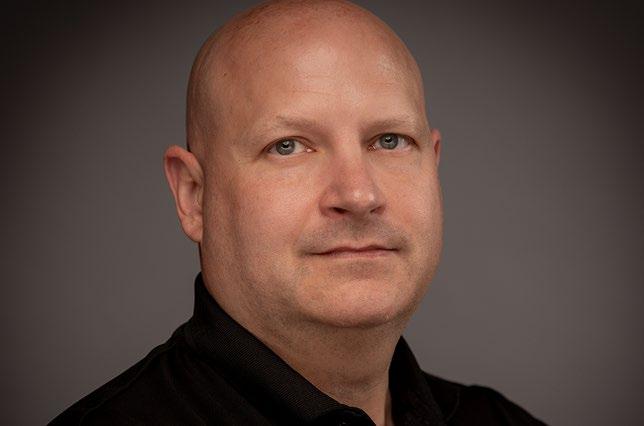
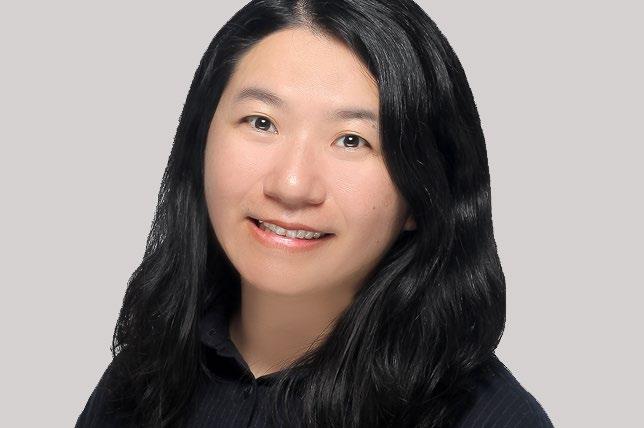
She/Her/Hers
Caitlyn is currently a Clinical Assistant Professor at the University of Utah - St. George Expansion Pathway. She has teaching roles in Adult Neuromuscular Management and Cardiopulmonary Management with additional interests in complex patient simulation, interprofessional education, and differential diagnosis. Caitlyn received her BS in Dietetics from the University of NebraskaLincoln in 2011 and her Doctor of Physical Therapy degree from Northwestern University in 2014. She maintains her clinical specializations in neurology and geriatrics by treating patients in acute care and inpatient rehabilitation environments. She is a lover of dogs, glitter, and tattoos.
He/Him/His
Eric is an Admissions Counselor for the Doctor of Physical Therapy program at the University of Utah. Previously, he was an academic advisor for health and human performance at Utah Tech University. Eric formed key partnerships that support ongoing collaboration between Utah Tech and the U. He is the co-founder of the Center for Adaptive Sport & Adventure. Eric received a bachelor’s degree in psychology from Dixie State University. He’s currently completing a master’s degree in Applied Behavior Analysis at University of Purdue Global. His academic interests involve developmental factors associated with at-risk populations. In his free time, he enjoys time with his family and can be found engaged in outdoor activities including hiking, biking, and walking his dog.
Lin-Na received her Ph.D. in Clinical Science-Health Service Research from the University of Texas Medical Branch. She is a biostatistician and Research Assistant Professor in the Department of Physical Therapy and Athletic Training at the University of Utah. She has more than ten years of experience as a biostatistician in industry and academic settings. Her work included a wide range of secondary database includes a wide range of database research in the areas of health services, clinical outcomes of health service research, outcome research, minority health and health equity. In her free time, she loves playing board game and making artwork with her two daughters.
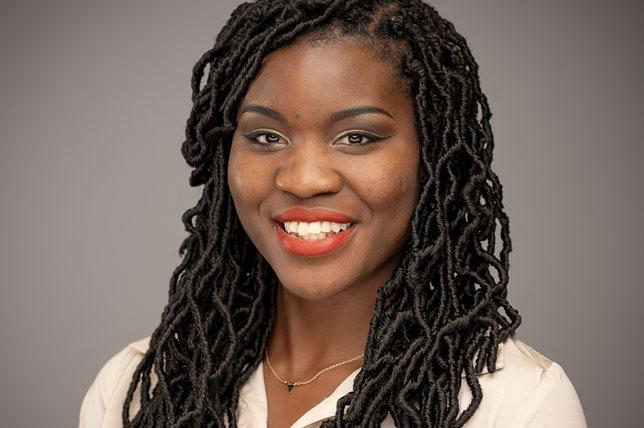 ANGELICA DENNIS ADMISSIONS COUNSELOR, HYBRID PATHWAY
ANGELICA DENNIS ADMISSIONS COUNSELOR, HYBRID PATHWAY
She/Her/Hers
Angelica Dennis is an Admissions Coordinator for the Hybrid DPT pathway and has worked at the UofU since 2019. Before her role in admissions, she was an Academic Advisor for the College of Social & Behavioral Science, where she served students pursuing degrees in Economics and Political Science. Angelica serves as the Chair of the University Academic Advising Committee (UAAC). This is a professional organization for advisors across the U of U. Originally, Angelica is from Toronto, Canada and moved to Utah in 2018 to be closer to her husband. They share two dogs named Georgia Peach –who is a therapy dog, and Lola Beans – who is a professional homebody. Angelica loves Broadway shows, dabbling in the kitchen, and making memories with family and friends!
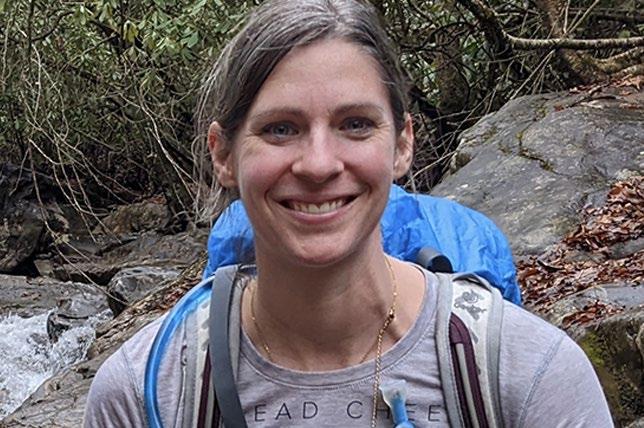 MAGGIE FRENCH
MAGGIE FRENCH, PT, DPT, PHD ASSISTANT PROFESSOR
MAGGIE FRENCH
MAGGIE FRENCH, PT, DPT, PHD ASSISTANT PROFESSOR
She/Her/Hers
Maggie is a Neurologic Certified Specialist who graduated with her DPT from Emory University in 2013. After practicing clinically, she got her PhD at the University of Delaware and completed her post-doctoral training at Johns Hopkins University. After thoroughly exploring the mid-Atlantic, she headed west to begin her position as a tenure-track Assistant Professor at the University of Utah in July 2023. Her research focuses on using real-world data to understand variability in recovery after stroke and occurs at the intersection of neurorehabilitation, healthcare informatics, and health services research. Outside of work, Maggie can be found spending time with her husband and dog while backpacking, running, and generally exploring.
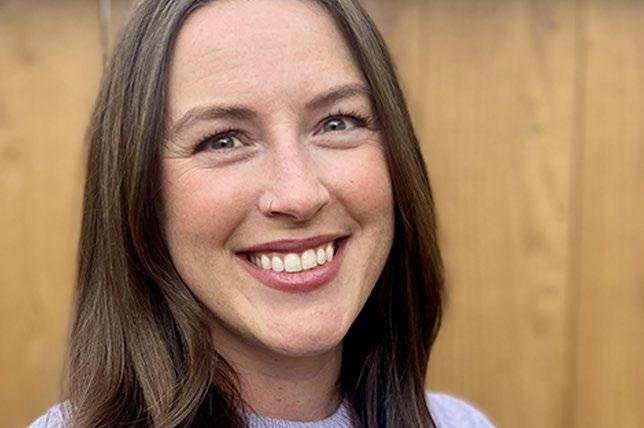 LISA HUTTON, M.ED. ASSOCIATE DIRECTOR OF STUDENT AFFAIRS She/Her/Hers
LISA HUTTON, M.ED. ASSOCIATE DIRECTOR OF STUDENT AFFAIRS She/Her/Hers
Lisa is a native of beautiful British Columbia, Canada (and also St. George, UT). She graduated from the U in 2008 in International Studies with a minor in German. In 2015 she completed her M.Ed. in Adult Learning and Global Change from the University of British Columbia.
Lisa has over a decade of experience in the high school, community college, and university levels of higher education and joined the PTAT team in July 2023. Her skillset provides a strong foundation to support the DPT program overall with a focus on the Hybrid Pathway students. Her own graduate work was online, and she’s excited to work with primarily online students from admission to graduation.
Outside of work, she can be found watching TV with her dogs, mountain biking, or cheering on Utah football and gymnastics.
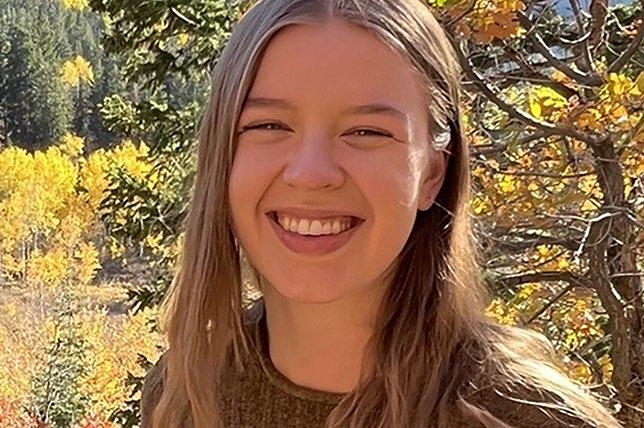 JESS LEIGHTON ACADEMIC PROGRAM MANAGER, ATHLETIC TRAINING
JESS LEIGHTON ACADEMIC PROGRAM MANAGER, ATHLETIC TRAINING
She/Her/Hers
Jess is a southern Alberta native, born and raised in Calgary. She attended Brigham Young University Idaho, earning her BS in Exercise Physiology. Jess has a deep appreciation for rehabilitative movement, wellness, and nutrition. Though still exploring different avenues, she hopes to pursue a health science graduate degree here at the U. She and her husband moved to Utah in 2021 and don’t plan on leaving anytime soon. Growing up in the mountains of Banff, Kananaskis, and Waterton National Park, Jess is enjoying the chance to explore all that Utah has to offer. She loves to hike, bake, read, and spoil her cats, Frodo and Jerry.

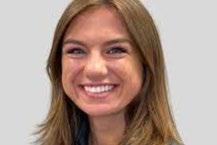 She/Her/Hers
She/Her/Hers
Maggie is a Utah local, having called Salt Lake City home for most of her life. She graduated from the University of Utah in 2018 with her BS in Strategic Communication and has worked in marketing and communication for the past seven years. She joined the Department of Physical Therapy and Athletic Training in May of 2023, helping fill a new position dedicated to promoting thWe many wonderful parts and people in the department, college, and community. She enjoys telling other people’s stories and trying to keep up with the latest social media trends, but in her spare time she likes the simple things: spending time with her dog, family, and friends. Maggie loves to travel and remind people she lived in Paris for a year–but don’t ask her if she speaks French. She is thrilled to be a part of the university again and implement her education on behalf of her alma mater. Go Utes!
LUTZ, PT, DPT CLINICAL INSTRUCTOR She/Her/HersJordan grew up in Minnesota where she completed her undergraduate studies at St. Olaf College. She received her Doctor of Physical Therapy degree from the University of Utah, graduating in 2022. After a short stint working in Whitefish MT, she now practices in the Balance and Mobility Clinic where she treats patients with dizziness and imbalance and enjoys being a clinical instructor for students. Outside of the clinic, Jordan enjoys long trail runs and adventuring with her Great Pyrenees, Moose.



She/Her/Ella
Noemy is the Program Manager for the DPT Hybrid Pathway Program. Noemy is originally from Los Angeles, California, and she is a first generation Mexican American. Noemy earned her bachelor’s degree in criminal justice and psychology, and her master’s degree in public administration from Southern Utah University. Before joining the College of Health, she worked as a social worker in the community supporting youth and families who needed access to resources. Noemy has a passion for helping others within her community. Aside from working, she likes to spend time with her family, at the lake during the summer, and looking for a new pair of sneakers.
She/Her/Hers
Crystal has a love and passion for health and is excited to be joining the department focusing on health services and disparity research. Established with the University of Utah health system for 12 years, she’s spent eight of them as a clinical research coordinator at the University of Utah in Neurology, first working with stroke patients in clinical trials and then shifting her focus to ALS patients in neuromuscular research. With a bachelor’s degree from the University of Utah in Health Promotion and Education, she’d love to pursue an MPH in epidemiology. She will then fulfill her lifetime love of learning by getting her doctorate in naturopathy and hopes to one day have a holistic practice. When not working, she’s tending to her herb garden, taking in neglected animals, and creating new concoctions in the kitchen. If asked to describe herself, she’d say “I’m a la cross between Jimmy Buffet and Martha Stewart” and “A Utah Man am I”.
Alicia recently joined the University of Utah as Assistant Professor and Associate Director of the DPT Hybrid Pathway, bringing expertise in hybrid DPT education, clinical education, and program development. As a Board-Certified Neurological Clinical Specialist, her teaching focuses on neurological and complex patient management. Her research aims to optimize student learning in hybrid environments. She continues to maintain a weekly clinical practice in acute care and neuro ICU settings. Alicia is married to Jim with son Liam (10) and daughter Nora (8). She lives in New York, and enjoys access the culture and food that NYC affords. She considers herself more outsidey than outdoorsy and you can find her at the beach in the summer.



Joshua, a Utah native, pursued his academic endeavors at Westminster College in Salt Lake City, where he dedicated his studies to Public Health, both his undergraduate and graduate degrees. Passionate about serving the aging community, Joshua aspires to further his education in medical school. Currently, he holds the role of Clinical Research Coordinator, overseeing two studies within the Department of Physical Therapy. His impactful contributions to research, particularly in Parkinson’s disease and chronic musculoskeletal conditions, have been profoundly fulfilling. Beyond his professional pursuits, Joshua finds enjoyment in literature, sports, and weightlifting.
Moses has been with the University of Utah for nine years and is a recent transfer into the Department of Physical Therapy and Athletic Training. He was hired as the Clinical Education Administrative Assistant where he helps students meet compliance and negotiates contracts with clinics for the students’ clinical rotations. He is a fourth generation Utahn with two granddaughters. He writes poetry, paints, sells Real Estate on the side, has a joyful personality and is a jokester who will scare co-workers just to get a laugh.
Kim joined the Department of Physical Therapy and Athletic Training as Executive Secretary in Salt Lake City early this year. Kim is excited to start her new career at the U working with such amazing people. She is a Utah native and enjoys spending her free time working with her hands making and creating. She is a long-time knitter and enjoys many other fiber and culinary activities.
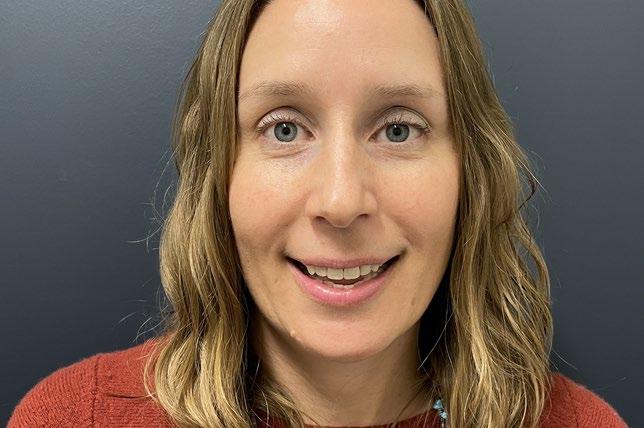


Alison started with the Department in February 2023 as the Director of Student Affairs for the Doctor of Physical Therapy program. Alison has worked in higher education for over 15 years helping students achieve their academic, career, and personal goals. She has a Master’s of Education in Educational Leadership in Policy from the University of Utah. The majority of her career has focused on international education working with international students and students pursuing learning abroad programs. She is enthusiastic about her career shift to working with DPT students. Alison loves spending time outdoors camping, hiking, and fly fishing and loves to share podcast recommendations.
Kelsie is an Administrative Assistant based in St. George. She has a Bachelor’s Degree in Communication and a background in Nonprofit Management. She began working for the department in August 2023. She enjoys supporting the various programs and pathways and is excited to be a part of the U of U expansion in St. George, which is the community she calls home. She enjoys traveling and hiking with her husband, friends, and dogs in sunny Southern Utah any chance she gets.
Altie is from Arizona/ New Mexico and married with two children. He completed the PTA Program in Farmington, NM before moving and getting settled in Salt Lake City. In August 2021, Altie obtained his PTA license, and is now working at the Balance and Mobility Clinic in the Department of Physical Therapy and Athletic Training. Altie enjoys Utah because of the nice people, work opportunities, and professionalism he has encountered. In his spare time Altie enjoys spending time with his wife and children. He looks forward to learning and growing more for his job and hopes to learn to ski or snowboard.
It is with a tinge of sadness but an immense amount of gratitude that we wish Dr. Gappmaier congratulations on his retirement as of June, 2023. Dr. Gappmaier received his Diploma in Physical Therapy from University Hospital, Innsbruck, Austria in 1982. He went on to receive his PhD in Exercise Physiology from Brigham Young University in 1993 and joined our Department in 1992. Since that time he continued to have significant impact through his research, teaching, advocacy, and service. Dr. Gappmaier was an invaluable contributor to all the curricular and degree transitions within the Department and DPT program. In particular, he was integral in our transition to our Doctor of Physical Therapy Degree. His skilled teaching of our Therapeutic Exercise and Cardiopulmonary Rehabilitation courses build a solid foundation for our students to excel in their internships and as practicing clinicians. In addition to his teaching in the entry level Physical Therapy program, Dr. Gappmaier was integral in the creation of the Rehabilitation Sciences PhD program and was a long-serving Director of Graduate Studies as well as a valuable mentor to new rehabilitation researchers. In addition to his teaching expertise, Dr. Gappmaier was an impactful scholar.
His work regarding aerobic exercise training in Multiple Sclerosis ( Petajan, Gappmaier et al, 1996 ) challenged the prevailing paradigm in Neurology that exercise was to be avoided in the context of neurodegenerative disease. This seminal work served as the foundation for all the current research examining exercise as a management tool for Multiple Sclerosis, Parkinson Disease, and other disorders. As a result of his expertise, Dr. Gappmaier is regarded a thought leader regarding rehabilitation and management of Multiple Sclerosis both nationally and internationally.
Dr. Gappmaier engaged in knowledge translation of his research decades before it became popularized. Following the publication of his seminal work, he successfully partnered with the National Multiple Sclerosis Society to create a patient wellness program. This program was the basis for all of the Department’s secondary prevention programs for individuals living with chronic neurologic conditions. Such efforts have resulted in substantial philanthropic gifts to the Department and led to the creation of the LS Skaggs Patient Wellness Center that exists in partnership with UHealth’s Wellness and Integrative Health Program.
 ED GAPPMAIER, PT, PhD
ED GAPPMAIER, PT, PhD

The Department of Physical Therapy and Athletic Training is indebted to Dr. Gappmaier for his leadership within the Department, College, and the Multiple Sclerosis rehabilitation community (locally, nationally, and internationally). We will miss his thoughtful council and his dry wit.

The graphic below is an illustration of the geographic diversity of the department’s classes of 2024–2026. The Department of Physical Therapy and Athletic Training welcomes students from around the country and the world. Upon graduation, the reach of our alumni spreads across all 50 states and multiple international locations.
16+ International
Iran (1)
Saudi Arabia (1)
South Korea (1)
China (3)
Kristen Santos-Griswold is an American short-track speed skater and a first-year Hybrid DPT student. She represented Team USA at the 2022 Olympics and has continued adding to her long list of accomplishments, both on and off the ice.
“The whole reason I wanted to become a physical therapist was because of speed skating. I have worked with physical therapists forever on multiple different things. I’ve had physical therapists who made all the difference in making me feel like I can improve. And I’ve had ones who have either dismissed my injury or who have told me I’d never skate again. These differing experiences made me want to become a physical therapist who will acknowledge that going through an injury is a serious experience while helping people be optimistic and motivated to improve and recover.
Since starting my physical therapy graduate program, I’ve learned a lot about how my body works and moves, and my skating has really benefited from that. I am by no means a physical therapy expert yet, but I have more of an understanding of better ways to recover, what my body needs and how that differs from other people. It’s exciting for my sport and my studies to intertwine with each other.”
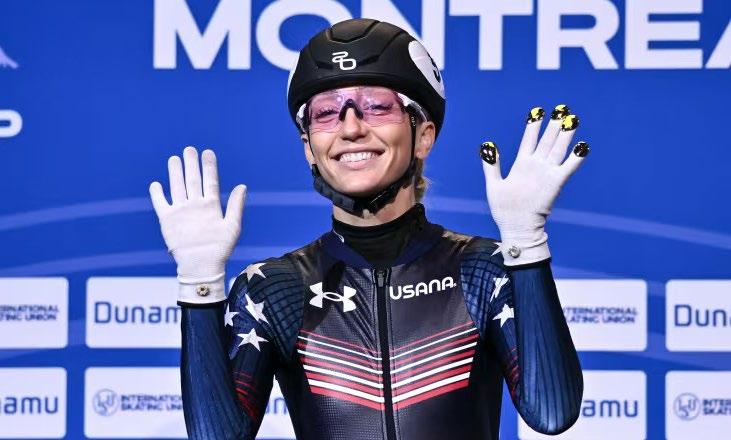



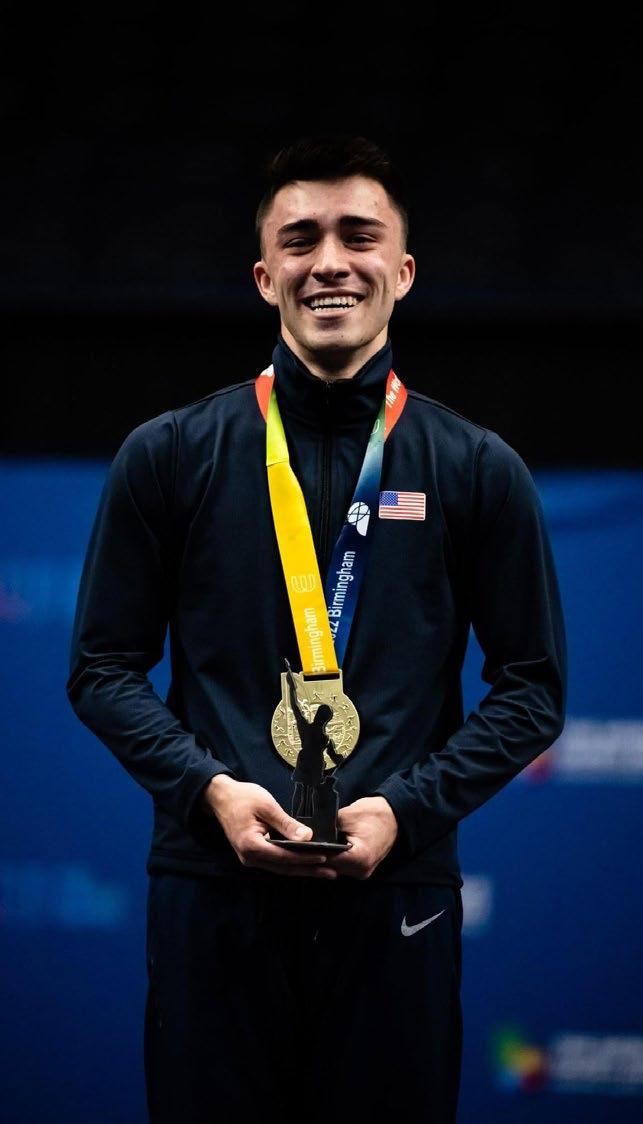

Kaden Brown is an American tumbler and a first-year Athletic Training student. He represents Team USA and is a World Silver Medalist and World Games Champion.
“It’s been really cool to see how much gymnastics impacted my athletic life and my academic life—it’s shifted my career path. At first I wanted to do engineering, but as my elite career started to take off, I got really interested in the health field.
I have worked with some incredible athletic trainers through my time as an elite gymnast, and as I spent more time with them, I fell in love with the profession, I knew it was exactly what I wanted to do. Their passion and ambition for the profession has completely captivated me, and I want to have the same impact on athletes lives like they did mine.
I have a few years left of being an athlete, but eventually I want to care for athletes in the ways my athletic trainers care for me.”
2023
Department faculty, staff, and students contribute to research that examines a broad spectrum of research areas from sub-cellular functions affecting muscle anabolism and catabolism to health services and drivers of rehabilitation health disparities. In addition to the broad range of content, our work extends beyond the traditional definition of research focused on discovery, and explores the scholarship of integration, engagement, and teaching and learning.
91 12 2
Publications
70
Continuing Book Peer Education chapters reviewed Courses presentations taught
Weston AR#, Dibble LE*, Hoppes CW, Loyd BJ#
People with multiple sclerosis and unilateral peripheral vestibular loss demonstrate similar alterations in head and trunk turning kinematics compared to healthy controls. Gait Posture. 2023 Sep;105:132-138.
Magel J*, Hartman P#, Fritz JM*, Koch
NN#, Dostal H, Vollmer N, Ferguson NL#, Tapken J, Cohee K*, Cochran G, Gordon AJ. Patients’ Perceptions of Physical Therapists
Addressing Opioid Misuse. Subst Abus. 2023 Jan-Apr;44(1):32-40.
Hayes HA*, Marcus R*, Stoddard GJ, McFadden M, Magel J*, Hess R. Is the Activity Measure for Postacute Care “6-Clicks” Tool Associated With Discharge Destination Postacute Stroke? Arch Rehabil Res Clin Transl. 2022 Sep 2;4(4):100228.
Bento H*, Fisk E#, Johnson E#, Goudelock B, Hunter M*, Hoekstra D#, Noren C*, Hatton N, Magel J*. Inspiratory Muscle Training While Hospitalized With Acute COVID-19 Respiratory Failure: A Randomized Controlled Trial. J Acute Care Phys Ther. 2023 Jul;14(3):134-142.
Fritz JM*, Gibson B#, Wetter DW, Del Fiol G, Solis V#, Ford I#, Lundberg K, Thackeray A*. Use of implementation mapping in the planning of a hybrid type 1 pragmatic clinical trial: the BeatPain Utah study. Implement Sci Commun. 2024 Jan 5;5(1):3.
Darter BJ, Syrett ED, Foreman KB*, Kubiak E, Sinclair S. Changes in frontal plane kinematics over 12-months in individuals with the Percutaneous Osseointegrated Prosthesis (POP). PLoS One. 2023 Feb 22;18(2):e0281339.
Bodkin SG*, Pethick JT, Dooley EA, Russell SD, Hart JM. Torque complexity of maximal knee extensor isometric contraction in individuals following anterior cruciate ligament reconstruction. Clin Biomech (Bristol, Avon). 2023 Apr;104:105932.
Rigby JH*, Canham SL, Farrell TW, Zeljkovic A, Hobson WL. Student Preferences for Virtual or In-Person Interprofessional Education Simulations. J Allied Health. 2024 Spring;53(1):e55-e59. PMID: 38430505.
Christensen JC*, Blackburn BE, Anderson LA, Gililland JM, Peters CL, Archibeck MJ, Pelt CE. Recovery Curve for Patient Reported Outcomes
and Objective Physical Activity After Primary Total Knee Arthroplasty-A Multicenter Study Using Wearable Technology. J Arthroplasty. 2023 Jun;38(6S):S94-S102.
Kumar A*, Roy I, Falvey J, Rudolph JL, RiveraHernandez M, Shaibi S, Sood P, Childers C, Karmarkar A. Effect of Variation in Early Rehabilitation on Hospital Readmission After Hip Fracture. Phys Ther. 2023 Mar 3;103(3):pzac170.
French MA*, Hayes H*, Johnson JK#, Young DL, Roemmich RT, Raghavan P. The effect of post-acute rehabilitation setting on 90-day mobility after stroke: A difference-in-difference analysis. medRxiv [Preprint]. 2024 Jan 9:2024.01.08.24301026.
Hale JL*, Knell G, Swartz MD, Shiroma EJ, Ellis T, Lee IM, Gabriel KP. Association of Parkinson’s disease status with accelerometer-derived physical activity and sedentary behavior in older women: The Women’s Health Study (WHS). Prev Med Rep. 2023 Aug 2;35:102361.
Kim J*, Kelley J, Ikramuddin S, Magel J*, Richards N, Adams T. Association of Pre-operative Arthritis with Long-Term Mortality Following Bariatric Surgery. J Gastrointest Surg. 2023 May;27(5):895-902.
Wells A, Rigby J*, Castel C, Castel D. Pulsed Red and Blue Photobiomodulation for the Treatment of Thigh Contusions and Soft Tissue Injury: A Randomized Controlled Trial. J Sport Rehabil. 2023 Oct 13;33(1):20-26.
Wenger LE*, Barrett DR, Rhon DI, Young JL. Evaluating and Characterizing the Scope of Care for Interventions Labeled as Manual Therapy in Low back Pain Trials: A Scoping Review. Phys Ther. 2023 Dec 29:pzad178.
Petrocelli JJ#, McKenzie AI#, de Hart NMMP, Reidy PT, Mahmassani ZS, Keeble AR, Kaput KL, Wahl MP, Rondina MT, Marcus RL*, Welt CK, Holland WL, Funai K, Fry CS, Drummond MJ*. Disuse-induced muscle fibrosis, cellular senescence, and senescence-associated secretory phenotype in older adults are alleviated during re-ambulation with metformin pre-treatment. Aging Cell. 2023 Nov;22(11):e13936.
* = Faculty member; # = Alumni, DPT, PhD, Post-doctoral fellow
We at the Department of Physical Therapy and Athletic Training believe in fostering excellence and shaping the future of healthcare. We are dedicated to cultivating skilled and compassionate professionals who make a significant impact on the lives of individuals seeking rehabilitation and wellness.
We have many scholarships designed to provide financial support to deserving students pursuing a career in physical therapy and athletic training. By contributing to these funds, you become an integral part of empowering the next generation of dedicated professionals.
• ACCESS TO EDUCATION: Your donation ensures talented and passionate individuals, regardless of their financial background, have the opportunity to pursue degrees in physical therapy and athletic training.
• ELEVATING STANDARDS: By investing in education, you play a vital role in maintaining high standards within the physical therapy and athletic training profession, ultimately contributing to improved healthcare outcomes.
• COMMUNITY IMPACT: Empowering phyiscal therapists and athletic trainers to positively impact their communities by promoting health, mobility, and overall well-being.
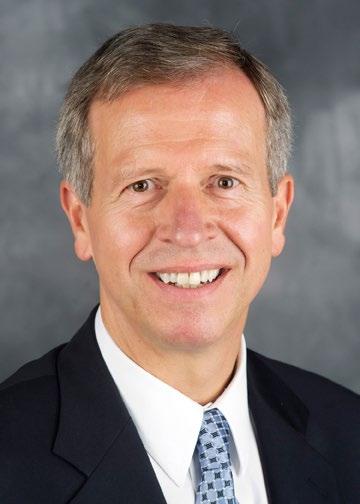
Your contribution, no matter the size, echoes our commitment to creating a world where everyone has access to quality healthcare. Together, let’s build a strong foundation for the future of physical therapy and athletic training. Thank you for being the driving force behind transformative education and healthcare excellence.
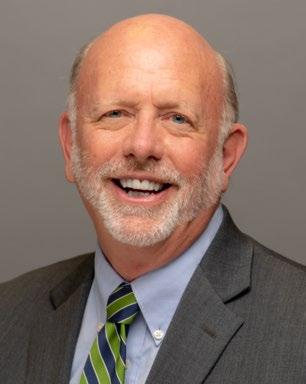


520 Wakara Way
Salt Lake City, Utah 84108
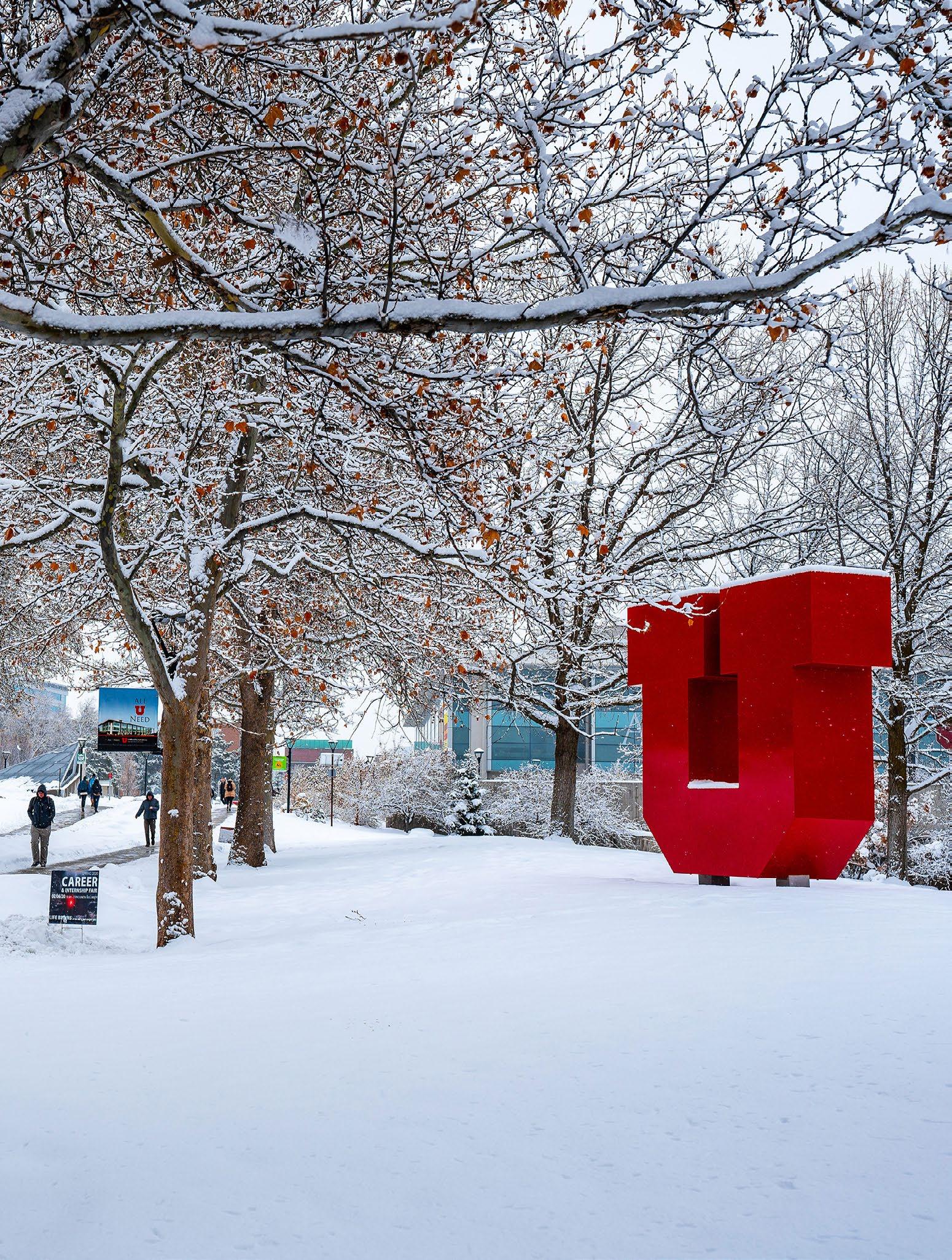
• Contribute to a scholarship
• Share your journey through an alumni profile
• Come back as a guest lecturer
• Engage on social media
health.utah.edu/physical-therapy-athletic-training @uofupt @uofuat